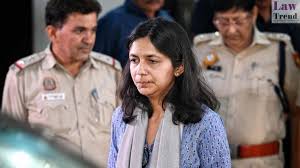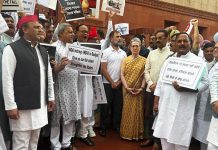The arrest of Bibhav Kumar, close aide of Delhi CM Kejriwal who is out on interim bail in liquor excise case, for assaulting the party’s Rajya Sabha MP Swati Maliwal at the CM’s residence has given a handle to the party’s detractors to paint it as anti-women outfit. A report by Aayush Goel

Still recovering from the blow dealt by the arrest of the party supremo and Delhi CM Arvind Kejriwal, the Aam Admi Party (AAP) has found itself embroiled in yet another controversy. On May 13, Bibhav Kumar, Kejriwal’s close aide, was arrested for assaulting party’s Rajya Sabha MP Swati Maliwal at CM’s residence. The controversy has put the party in a tight spot which is now being painted as an anti-woman. Kumar is in custody and his bail has been denied by the local court.
The court room revelations by Maliwal have come as another blow to the party that is now blaming BJP for orchestrating the incident. The political circles were jolted when on May 13 Maliwal dialled the Delhi Police control room alleging assault at Kejriwal’s official residence in Civil Lines by Kumar, who was Kejriwal’s personal assistant till April. Initially, the party leaders tried to resolve the matter internally. On 14 May, AAP Rajya Sabha MP Sanjay Singh admitted that Kumar indeed had misbehaved with Maliwal and action would be taken against him, as Kejriwal has taken a strong view on the matter.
However soon after, Kumar was seen accompanying Kejriwal to Lucknow and this reportedly left Maliwal seething and prompted her to lodge a formal complaint against Kumar on 16 May. Soon after, Kumar was booked under IPC sections 308 (attempt to commit culpable homicide), 341 (wrongful restraint), 354(b) (assault or use of criminal force against a woman with the intent to disrobe her), 506 (criminal intimidation) and 509 (word, gesture or act intended to insult the modesty of a woman). On May 17, AAP came out all guns blazing against Maliwal, a long-time associate of Kejriwal since his days as activist claiming she was being ‘handled’ by the BJP.
Delhi minister and AAP leader Atishi claimed the entire episode was ‘scripted’ by the BJP, which used Maliwal to execute it. She also claimed that Maliwal was doing it to avoid being implicated in an alleged recruitment scam in the Delhi Commission for Women (DCW), which she headed between 2015 and January this year. Kumar was however nabbed and after an initial five-day police custody starting on 19 May, he was remanded to a four-day judicial custody.
Denial of Bail
The Delhi Court rejected the bail plea of Kumar citing allegations have to be taken at face value. “A mere delay in registration of FIR does not hold any impact as medical report substantiates injury even after four days of alleged assault and there seems to be no pre-meditation in filing of the complaint,” said the court while rejecting the bail plea. The judge also emphasised that influencing witnesses and tampering with evidence cannot be ruled out considering the “nascent” stage of the investigation.
“Keeping in view the allegations made against the applicant, at this stage, no ground for bail is made out,” the additional sessions Judge, Sushil Anuj Tyagi wrote in the order. Maliwal was present in the court while Kumar’s bail plea was being heard and argued that Kumar was a very powerful and close associate of Kejriwal. She voiced concerns over her own and her family’s safety, should Kumar be granted bail, citing his involvement in an AAP protest following his arrest. “If Bibhav Kumar is allowed to come out, my life and my family’s life would be in grave danger,” she told the court. Bibhav Kumar wields unparalleled influence within the AAP, yet he has consistently chosen to remain in the shadows over the years. Some of his activities have drawn attention in the past too, but nothing put a glaring spotlight on him as much as the latest controversy involving AAP Rajya Sabha MP Swati Maliwal. Both Maliwal and Kumar started working with Kejriwal around the same time, around two decades ago.
Kejriwal versus Maliwal
Breaking his silence on the alleged assault on Maliwal at his residence, Kejriwal said he wants justice to be served in the matter after a fair investigation. In an interview, AAP national convenor Kejriwal said the issue involving Maliwal’s allegation that she was beaten up by his personal aide Bibhav Kumar was “sub-judice” and his comment might affect the proceedings. “But I expect there will be a fair investigation. Justice should be served. There are two versions of the event. Police should investigate both versions fairly and justice should be done,” said Kejriwal who is out on bail till June 1.
Maliwal shot back, saying she has no faith in Kejriwal’s words as she has been at the receiving end of attacks by AAP leaders and volunteers who have already declared her a “BJP agent”. Maliwal pointing out that the AAP had already indulged in her character assassination. “After unleashing the entire army of leaders and volunteers at me, calling me a BJP agent, assassinating my character, leaking edited videos, victim-shaming me, roaming around with the accused, letting him re-enter the crime scene and tamper with evidence and protesting in favour of the accused, the chief minister, in whose drawing room I was beaten up, has finally said that he wants free and fair investigation in the matter. Irony died a thousand deaths. I don’t buy this one bit,” she wrote on X.
According to party sources things started going downhill way before the assault case. The CM was not happy with her prolonged absence from Delhi before and after his arrest. While Maliwal has been silent on the rift, sources claim she was upset over being asked to relinquish her Rajya Sabha membership so that the party could accommodate the Congress’s Abhishek Manu Singhvi, Kejriwal’s lawyer in the excise policy case.
Bibhav Kumar
Bibhav Kumar, who hails from Bihar, has had a long association with Kejriwal and former Deputy CM Manish Sisodia. He worked with their NGO Parivartan, which was launched in June 2000, since its inception, working closely with them in slum areas, focusing on the public distribution system. After the AAP formed government in Delhi in 2015, Kumar was appointed Kejriwal’s personal secretary, a post he held till last month when the Delhi Directorate of Vigilance sacked him from the post in connection with a 2007 case in which he was accused of using “criminal force to deter a public servant from discharge of his duty”.
During the ‘India against Corruption’ movement, which was led by Kejriwal with Anna Hazare as its face, Kumar’s skills as a video editor also came in handy as he handled Vlogs that used to be published then.
He also handled media relations, a task he continued to do even as Kejriwal’s personal secretary despite the presence of a separate communications team. As personal secretary, Kumar also took care of Kejriwal’s food and medicines when they were on the road. The Maliwal episode is not Kumar’s first brush with a controversy as he had drawn attention even in 2015, during Kejriwal’s fight with Yogendra Yadav and Prashant Bhushan. It had emerged that Kumar, in August 2014, had allegedly recorded his telephone conversation with journalist Chander Suta Dogra, who was then working with The Hindu, without her consent. Later, the audio of the conversation in which Dogra had named Yadav as the source of a story critical of the AAP, was used by the party to prepare the ground for his expulsion.
Kumar was also allotted a Type VI government bungalow later, but in August 2023, the Delhi Vigilance Department wrote to the Public Works Department directing that the allocation of the bungalow to him be cancelled and the accommodation be downgraded to Type IV instead. Premises linked to Kumar were raided by the ED in February this year in connection with a money laundering case related to the Delhi Jal Board. Later, he was also questioned by the ED in connection with the excise policy case, which led to Kejriwal’s arrest in March. The Delhi CM, meanwhile, is out on an interim bail currently. While in jail, Kejriwal had given a list of six people whom he wanted to meet regularly under the prison rules and Kumar made it to the list.













